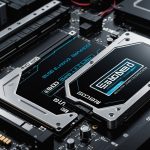Overview of SSDs vs. HDDs
In gaming, storage devices play a critical role in performance and user experience. The two primary options are SSD (Solid State Drives) and HDD (Hard Disk Drives). Each has unique qualities, beginning with their construction and technology.
SSDs use flash memory to store data, eliminating moving parts. This design ensures faster data access and increased SSD performance, making them invaluable for quick game loading. In contrast, HDDs rely on spinning disks to read and write data, resulting in slower access but often providing more storage capacity at a lower cost. As a result, they are still popular gaming storage options, especially where budget constraints are a concern.
Also to discover : Key components for designing an intuitive inventory system in intricate rpgs
The distinction in performance between the two is particularly significant for gamers. SSD performance translates into faster boot times and seamless game loading, enhancing the overall gaming experience. HDD performance may not meet these high-speed demands as efficiently, leading to longer load times.
For technology enthusiasts and gamers, understanding these differences is crucial. Choosing between SSDs and HDDs depends on individual priorities, such as budget, storage capacity needs, and the desired speed of gaming storage options. Each choice brings a distinctive set of advantages tailored to specific gaming setups.
Have you seen this : Must-have gaming accessories for an unforgettable, immersive experience: a gamer’s guide
Speed and Load Times
The speed and efficiency of gaming systems often come down to the choice between Solid State Drives (SSDs) and Hard Disk Drives (HDDs). SSD performance significantly enhances game load times, offering almost instantaneous access to data. This speed stems from the absence of spinning disks, which allows SSDs to reduce load times dramatically, providing a smoother gameplay experience.
For example, games such as “The Witcher 3” and “Grand Theft Auto V” demonstrate notable load time differences. While an HDD could take several minutes to load these extensive game worlds, an SSD achieves this in roughly half the time or better, thanks to faster data transfer rates. This distinction is crucial for gamers who prioritize a seamless experience without frequent interruptions.
Beyond mere numbers, quick game loading speed enhances fluidity and engagement, ensuring players stay connected with their gaming worlds. Speed metrics, such as read/write rates and access times, underscore the value of SSDs in modern gaming setups. Understanding these metrics can aid gamers in selecting storage solutions aligned with their gaming performance expectations and preferences.
Reliability and Durability
When assessing storage reliability in gaming, it’s crucial to compare the SSD durability with the HDD lifespan. SSDs, devoid of mechanical parts, typically offer a more reliable experience, with lower chances of mechanical failure compared to HDDs, which rely on spinning disks. This fundamental difference significantly influences their failure rates, making SSDs a preferred choice for durability.
Environmental factors such as temperature and humidity can impact both storage types. SSDs are more resilient in variable conditions since they have no moving parts that can be affected by vibrations or shocks. Conversely, HDDs are more susceptible to damage from such external influences, potentially shortening their lifespan.
When considering long-term performance, SSD durability offers a stable option for gamers focused on longevity. HDDs, while affordable, might require more frequent replacements over time due to wear and tear on moving components. In gaming setups prioritising storage reliability, SSDs provide an edge, ensuring consistent performance and reducing the risk of unexpected data loss.
Ultimately, the robustness of SSDs makes them an attractive choice for those seeking dependable gaming storage solutions that withstand the test of time.
Overall Gaming Experience
In the realm of gaming, the choice between SSD and HDD can greatly affect both gaming performance and user experience. Gamers typically experience enhanced responsiveness and decreased stuttering when opting for SSD gaming storage. These advantages stem from the SSD’s ability to swiftly read and write data, a significant boon for players eager for uninterrupted gameplay.
Gamers often report that using SSDs curtails in-game lag, a common frustration with the slower access speeds of HDDs. During action-packed moments, the readiness of SSD gaming storage can mean the difference between victory and defeat. The seamless processing of textures, sounds, and animations ensures that players remain immersed in their digital worlds.
Testimonials from avid gamers frequently highlight how gaming storage impact is non-negligible, with SSDs providing an indisputable edge by improving load speeds and minimizing wait times. As competitive gaming continues to evolve, the emphasis on swift data access becomes even more pronounced.
Ultimately, the role of gaming storage is pivotal. It directly dictates game fluidity and interaction. As users demand superior gaming performance, opting for storage solutions that align with their expectations remains essential.
Practical Examples and Benchmarks
In the realm of gaming benchmarks, SSD benchmarks often highlight a substantial advantage over HDD benchmarks. This is especially evident in tests measuring game loading speed and performance. For instance, SSDs significantly reduce game load times, providing almost double the speed compared to traditional HDDs.
Take popular titles like “Assassin’s Creed Valhalla”: Gaming benchmarks show that using an SSD can cut the initial loading time by up to 50%, elevating the overall gaming experience. Such enhancements are chiefly due to the SSD’s superior data transfer rates and reduced latency.
When comparing frame rates, SSDs tend to support smoother gameplay transitions, while HDD benchmarks can display slight lags, especially in graphically demanding scenes. This difference is crucial for gamers aiming for an uninterrupted flow, as frame rate consistency often dictates visual quality.
Recommended HDDs and SSDs in benchmark results focus on individual gamer needs:
- For high-performance setups: Look towards robust SSD options.
- For cost-effective solutions: HDDs can still deliver, albeit with adjusted expectations.
Overall, understanding these gaming benchmarks aids in selecting an optimal storage setup, balancing performance with the budget.
Recommendations for Different Gaming Needs
Choosing the right gaming storage hinges on individual preferences and gaming demands. For speed-driven games where rapid data access is crucial, the best SSDs for gaming are recommended. SSDs afford swift load times and reduced lag, essential for genres like action or competitive online games, ensuring a smooth, immersive experience.
For budget-minded gamers, balancing cost with performance can be achieved by selecting the best HDDs for gaming. HDDs offer larger storage capacities economically, suitable for those who require extensive game libraries but can compromise on speed. This is particularly advantageous for games less reliant on high load speed, such as simulation or strategy titles.
Hybrid storage solutions, which combine SSDs for system files and key games with HDDs for broader storage, cater to varied needs effectively. This approach marries the speed benefits of SSDs with the economical storage of HDDs, allowing for a versatile gaming setup.
Here are some recommendations:
- High-end setups: Prioritise top-tier SSDs for unparalleled speed.
- Budget-conscious setups: Opt for reliable HDDs with generous capacity.
- Hybrid setups: Leverage the benefits of both SSDs and HDDs for optimal performance and storage.
Pros and Cons of Each Storage Type
In gaming, understanding the SSD advantages over HDD disadvantages helps determine the best storage trade-offs. SSDs, known for their speed, offer rapid load times, crucial for action-packed games where every second counts. Their lack of moving parts reduces the risk of mechanical failure, contributing to enhanced SSD durability. This reliability is vital for intense gaming sessions, where consistent performance is paramount.
Conversely, HDDs present advantages in other contexts. They provide a cost-effective solution for gamers needing expansive storage without hefty expenses. Players with comprehensive libraries of less graphics-intensive games often find HDDs sufficient. However, these come with disadvantages: slower data access and potential vulnerability due to mechanical components.
Deciding between these two options involves considering cost vs. performance. While SSDs are typically more expensive, the speed and reliability may justify the price for gamers seeking optimal gaming performance. On the other hand, budget-conscious players might opt for HDDs, acknowledging the storage trade-offs such as slower speeds.
Ultimately, the decision hinges on individual priorities and gaming styles, balancing immediate needs with future gaming aspirations.
Tips for Optimizing Performance through Storage Choices
To maximise gaming performance, effective storage optimisation is key. When utilising SSDs, several strategies can enhance their potential. First, ensure regular firmware updates to maintain optimal SSD performance—these updates can address critical bugs and improve efficiency.
For boosting game load times, consider enabling the TRIM command, which helps SSDs manage unused data blocks, enhancing speed and longevity. Periodically clearing unnecessary files also prevents SSDs from becoming sluggish.
Balancing storage optimisation with HDDs involves a different approach. Defragmenting these drives periodically can significantly improve access speeds. This process rearranges fragmented data, allowing for quicker read/write operations, contributing to more consistent gaming performance. Additionally, maintaining at least 15% free space helps HDDs operate efficiently.
Beyond software strategies, hardware considerations also play a part. Ensure your gaming rig is equipped with SATA III cables for ideal data transfer rates, and if budgets allow, incorporating hybrid storage solutions—combining SSDs for performance-critical applications with HDDs for mass storage—provides an adaptable setup.
These gaming performance tips offer a comprehensive approach, tailored to extracting maximum efficiency from your current storage technology. Proper care and strategic enhancements ensure you’re getting the most from your gaming storage.











